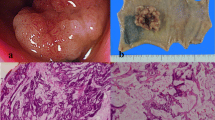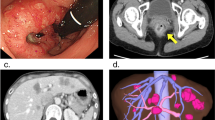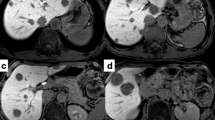Abstract
The vast majority of colorectal cancer patients who present with liver metastases are not initially candidates for hepatic resection. Although the combination of systemic chemotherapy and liver surgery can convert a significant proportion of patients from a palliative situation to a potentially curative situation, the majority of initially unresectable liver metastases do not respond sufficiently to initial chemotherapy to become resectable. More recently the addition of biologic agents (bevacizumab or cetuximab) to cytotoxic chemotherapy has increased the rate of tumor response, suggesting that the addition of these agents could improve resectability rate. Here we report the clinical case of a complete pathological response (pCR) in a 67-year-old male affected by metastatic colorectal cancer, with initially unresectable liver metastases, after treatment with chemotherapy and bevacizumab.
Similar content being viewed by others
References
Jemal A, Siegel R et al (2007) Cancer Statistics. CA Cancer J Clin 57:43–66
Parkin DM, Bray F et al (2005) Global Cancer Statistics, 2002. CA Cancer J Clin 55:74–108
Greene FL (2002) Updating the Strategies in Cancer Staging. American College of Surgeons Bulletin 87:13–15
Adam R (2003) Chemotherapy and surgery: new perspectives on the treatment of unresectable liver metastases. Ann Oncol 14(Suppl 2):ii13–ii16
Fong Y, Cohen A, Fortner JG et al (1997) Liver resection for colorectal metastases. J Clin Oncol 15:938–946
Ballantyne GH, Quin J (1993) Surgical treatment of liver metastases in patients with colorectal cancer. Cancer. 71(12 Suppl):4252–4266
Folprecht G, Grothey A, Alberts S et al (2005) Neoadjuvant treatment of unresectable colorectal liver metastases: correlation between tumour response and resection rates. Ann Oncol 16(8):1311–1319
De Gramont A, Figer A et al (2000) Leucovorin and fluorouracil with or without oxaliplatin as first-line treatment in advanced colorectal cancer. J Clin Oncol 18(16):2938–2947 Aug
Saltz LB, Cox JV et al (2000) Irinotecan plus fluorouracil and leucovorin for metastatic colorectal cancer. N Engl J Med (343):905–914
Tournigand C, André T et al (2004) FOLFIRI Followed by FOLFOX6 or the Reverse Sequence in Advanced Colorectal Cancer: A Randomized GERCOR Study. J Clin Oncol 22:229–237
Leonard GD, Brenner B et al (2005) Neoadjuvant chemotherapy before liver resection for patients with unresectable liver metastases from colorectal carcinoma. J Clin Oncol 23:2038–2048
Pozzo C, Basso M et al (2004) Neoadjuvant treatment of unresectable liver disease with irinotecan and 5-fluorouracil plus folinic acid in colorectal cancer patients. Ann Oncol 15:933–939
Falcone A, Ricci S et al (2007) Phase III trial of infusional fluorouracil, leucovorin, oxaliplatin, and irinotecan (FOLFOXIRI) compared with infusional fluorouracil, leucovorin, and irinotecan (FOLFIRI) as first-line treatment for metastatic colorectal cancer. J Clin Oncol 25:1670–1676
Gil Delgado M, Spano JP et al (2007) Cetuximab plus irinotecan in refractory colorectal cancer patients. Expert Rev Anticancer Ther 7(4):407–413
Saltz LB, Douillard JY et al (2001) Irinotecan plus fluorouracil/leucovorin for metastatic colorectal cancer: a new survival standard. Oncologist 6(1):81–91
Cunningham D, Humblet Y, Siena S et al (2003) Cetuximab (C225) alone or in combination with irinotecan (CPT-11) in patients with epidermal growth factor receptor (EGFR)-positive, irinotecan-refractory metastatic colorectal cancer (MCRC). Proc Am Soc Clin Oncol 22:252 (abstr 1012)
Minagawa N, Nakayama Y et al (2002) Correlation of plasma level and immunohistochemical expression of vascular endothelial growth factor in patients with advanced colorectal cancer. Anticancer Res 22(5):2957–2963
Willett CG, Boucher Y et al (2004) Direct evidence that the VEGF-specific antibody bevacizumab has antivascular effects in human rectal cancer. Nat Med 10(2):145–147
Kabbinavar FF, Hambleton J et al (2005) Combined analysis of efficacy: the addition of bevacizumab to fluorouracil/leucovorin improves survival for patients with metastatic colorectal cancer. J Clin Oncol 23(16):3660–3662
Hurwitz H, Fehrenbacher L et al (2004) Bevacizumab plus irinotecan, fluorouracil, and leucovorin for metastatic colorectal cancer. N Engl J Med 350(23):2335–2342
Bismuth H, Adam R et al (1996) Resection of nonresectable liver metastases from colorectal cancer after neoadjuvant chemotherapy. Ann Surg 224:509–520
Giacchetti S, Itzhaki M et al (1999) Long-term survival of patients with unresectable colorectal cancer liver metastases following infusional chemotherapy with 5-fluorouracil, leucovorin, oxaliplatin and surgery. Ann Oncol 10:663–669
Van Cutsem E, Nowacki M et al (2007) Randomized phase III study of irinotecan and 5-FU/FA with or without cetuximab in the first-line treatment of patients with metastatic colorectal cancer (mCRC): The CRYSTAL trial. 2007 ASCO Annual Meeting: abstract 4000
Tabernero J, Van Cutsem E et al (2004) An international phase II study of cetuximab in combination with oxaliplatin/5-fluorouracil (5-FU)/folinic acid (FA) (FOLFOX-4) in the first-line treatment of patients with metastatic colorectal cancer (CRC) expressing Epidermal Growth Factor Receptor (EGFR). Preliminary results. Proc Am Soc Clin Oncol 2004, 23:3512 abstract
Cassidy J, Cunninghamet D et al (2008) Surgery with curative intent in patients (pts) treated with first-line chemotherapy (CT) + bevacizumab (BEV) for metastatic colorectal cancer (mCRC): First BEAT and NO16966. J Clin Oncol 26:4022 abstract
Berry SR, Van Cutsem E et al (2008) Final efficacy results for bevacizumab plus standard first-line chemotherapies in patients with metastatic colorectal cancer: First BEAT. J Clin Oncol 26:4025 abstract
Falcone A, Masi G et al (2008) Folfoxiri (irinotecan, oxaliplatin, and infusional 5FU/LV) in combination with bevacizumab (BV) in the first-line treatment of metastatic colorectal cancer (mCRC): A phase II study by the G.O.N.O. group. 2008 ASCO Annual Meeting: abstract 4031
Saltz L, Clarke S, Diaz-Rubio E et al (2007) Bevacizumab (Bev) in combination with XELOX or FOLFOX4: updated efficacy results from XELOX-1/NO16966, a randomized phase III trial in first-line metastatic colorectal cancer. J Clin Oncol 24(18S):4028
Author information
Authors and Affiliations
Corresponding author
Rights and permissions
About this article
Cite this article
Vitiello, F., Ricci, V., Martinelli, E. et al. Complete pathological response of colorectal liver metastases after chemotherapy and bevacizumab treatment: a case report. Targ Oncol 3, 253–258 (2008). https://doi.org/10.1007/s11523-008-0094-5
Received:
Accepted:
Published:
Issue Date:
DOI: https://doi.org/10.1007/s11523-008-0094-5




